2025年牛津译林版英语中考专题复习课件:九年级(上)Units 1-4 (共44张PPT)
文档属性
| 名称 | 2025年牛津译林版英语中考专题复习课件:九年级(上)Units 1-4 (共44张PPT) |

|
|
| 格式 | pptx | ||
| 文件大小 | 1.5MB | ||
| 资源类型 | 教案 | ||
| 版本资源 | 牛津译林版 | ||
| 科目 | 英语 | ||
| 更新时间 | 2025-03-11 14:18:41 | ||
图片预览

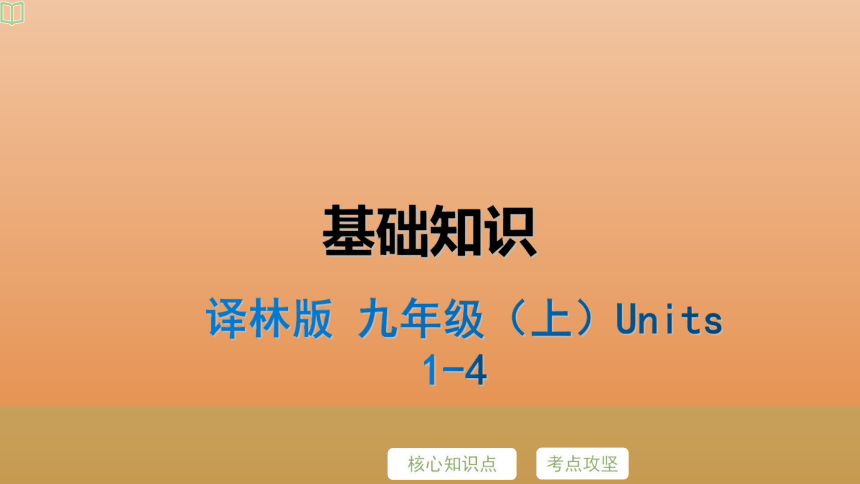

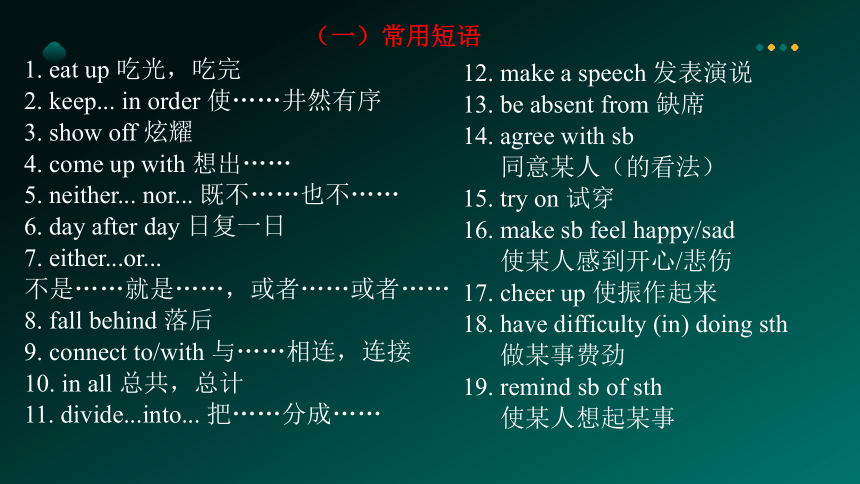

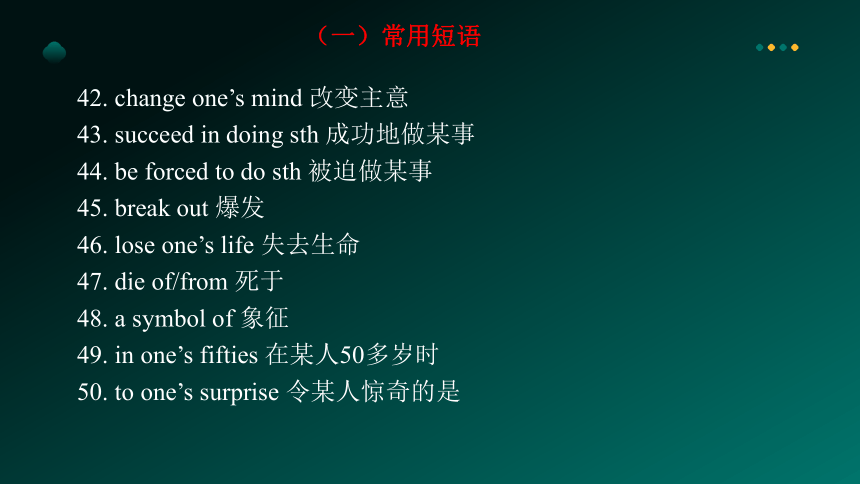
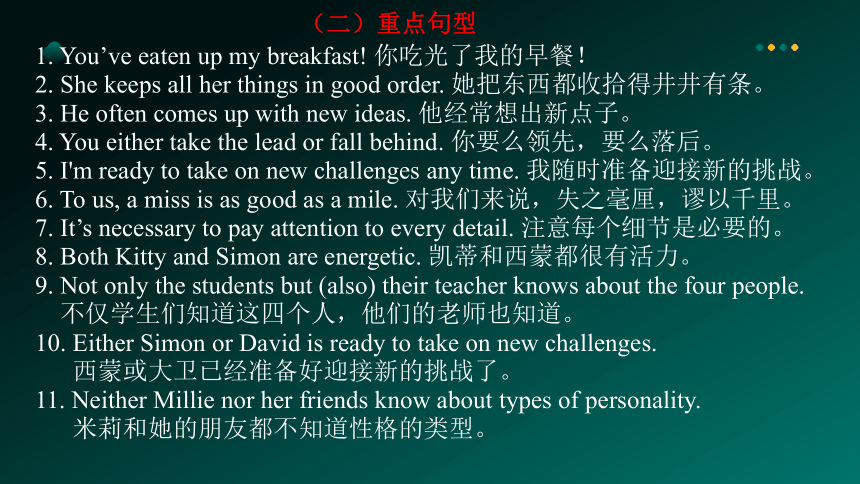
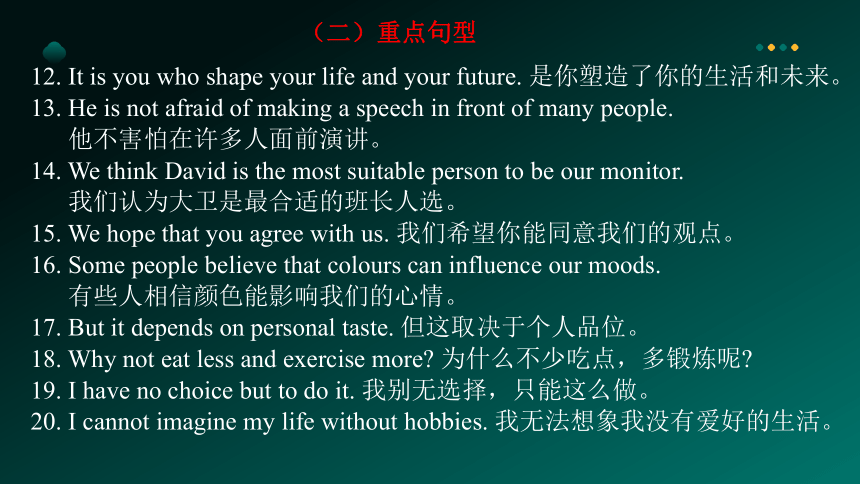
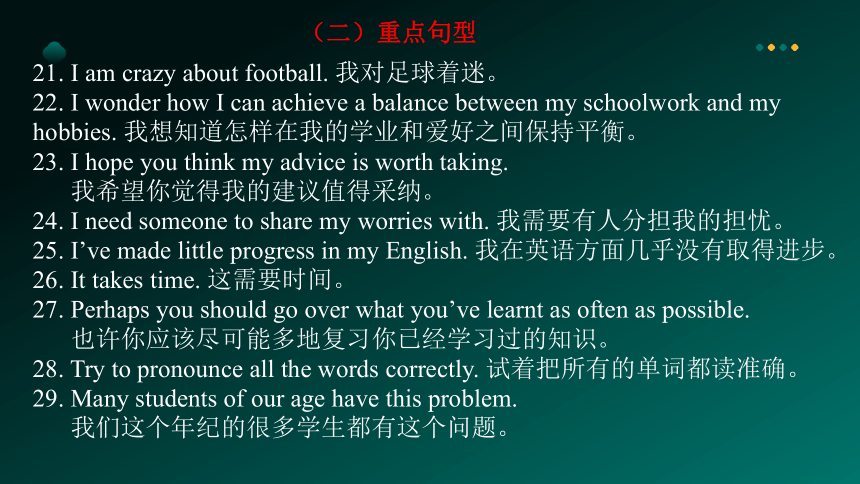
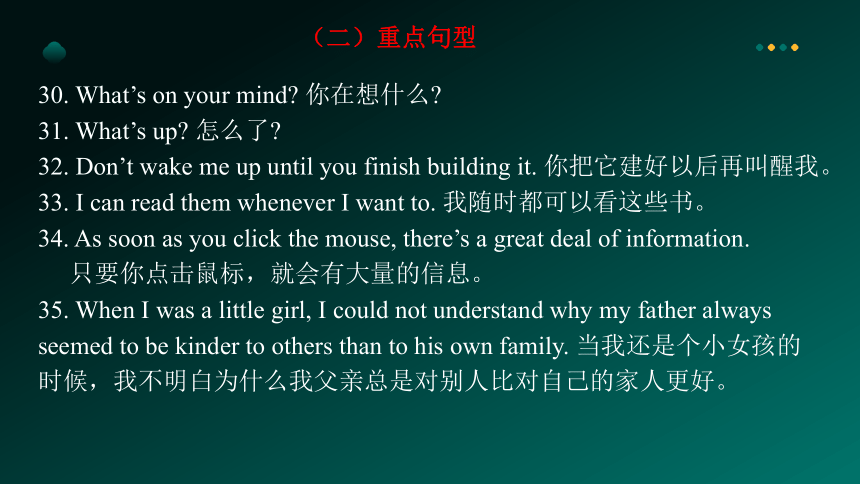
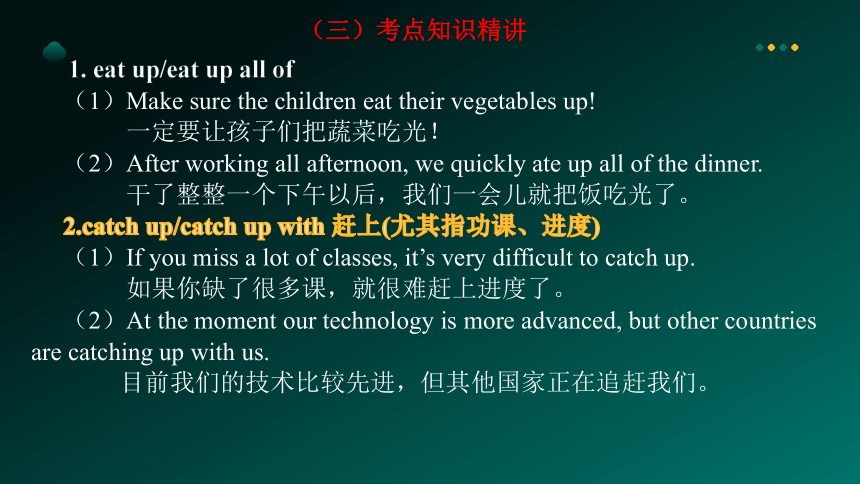
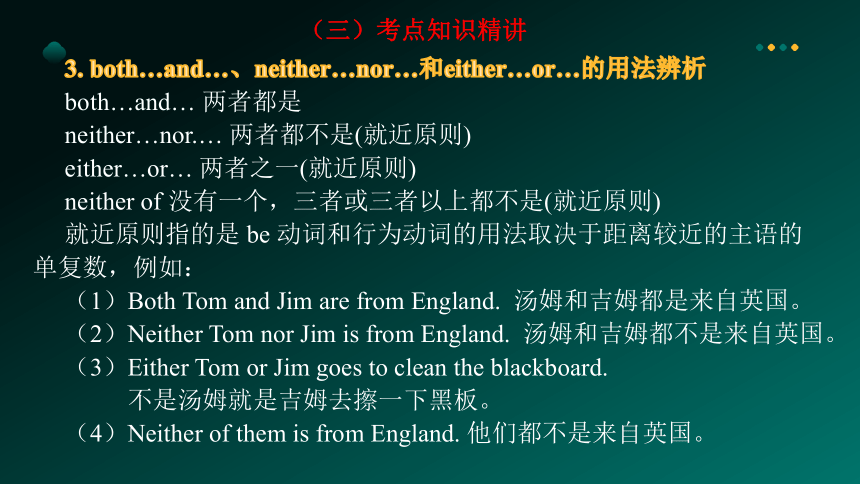
文档简介
(共44张PPT)
2025年英语中考复习
基础知识
译林版 九年级(上)Units 1-4
核心知识点
贰
(一)常用短语
1. eat up 吃光,吃完
2. keep... in order 使……井然有序
3. show off 炫耀
4. come up with 想出……
5. neither... nor... 既不……也不……
6. day after day 日复一日
7. either...or...
不是……就是……,或者……或者……
8. fall behind 落后
9. connect to/with 与……相连,连接
10. in all 总共,总计
11. divide...into... 把……分成……
12. make a speech 发表演说
13. be absent from 缺席
14. agree with sb
同意某人(的看法)
15. try on 试穿
16. make sb feel happy/sad
使某人感到开心/悲伤
17. cheer up 使振作起来
18. have difficulty (in) doing sth
做某事费劲
19. remind sb of sth
使某人想起某事
(一)常用短语
20. would rather (=’d rather)
宁愿,更喜欢
21. get fat 变胖
22. get enough sleep
好好睡一觉,获得充足睡眠
23. drive sb mad 使某人发狂
24. close friends 亲密的朋友
25. deal with 处理,处置
26. stay up late 熬夜
27. stay awake 保持清醒
28. be worth doing sth 值得做某事
29. get into trouble 惹上麻烦
30. be strict with sb 对某人要求严格
31. work out 算出,解决
32. according to 根据
33. laugh at 嘲笑
34. pay no attention to 不注意
35. be proud of 为……感到骄傲
36. go over 复习,回顾
37. don’t mention it 不客气
38. shout at 对……大喊大叫
39. as soon as 一……就……
40. a great deal of 大量,许多
41. lose heart 泄气,灰心
(一)常用短语
42. change one’s mind 改变主意
43. succeed in doing sth 成功地做某事
44. be forced to do sth 被迫做某事
45. break out 爆发
46. lose one’s life 失去生命
47. die of/from 死于
48. a symbol of 象征
49. in one’s fifties 在某人50多岁时
50. to one’s surprise 令某人惊奇的是
(二)重点句型
1. You’ve eaten up my breakfast! 你吃光了我的早餐!
2. She keeps all her things in good order. 她把东西都收拾得井井有条。
3. He often comes up with new ideas. 他经常想出新点子。
4. You either take the lead or fall behind. 你要么领先,要么落后。
5. I'm ready to take on new challenges any time. 我随时准备迎接新的挑战。
6. To us, a miss is as good as a mile. 对我们来说,失之毫厘,谬以千里。
7. It’s necessary to pay attention to every detail. 注意每个细节是必要的。
8. Both Kitty and Simon are energetic. 凯蒂和西蒙都很有活力。
9. Not only the students but (also) their teacher knows about the four people.
不仅学生们知道这四个人,他们的老师也知道。
10. Either Simon or David is ready to take on new challenges.
西蒙或大卫已经准备好迎接新的挑战了。
11. Neither Millie nor her friends know about types of personality.
米莉和她的朋友都不知道性格的类型。
(二)重点句型
12. It is you who shape your life and your future. 是你塑造了你的生活和未来。
13. He is not afraid of making a speech in front of many people.
他不害怕在许多人面前演讲。
14. We think David is the most suitable person to be our monitor.
我们认为大卫是最合适的班长人选。
15. We hope that you agree with us. 我们希望你能同意我们的观点。
16. Some people believe that colours can influence our moods.
有些人相信颜色能影响我们的心情。
17. But it depends on personal taste. 但这取决于个人品位。
18. Why not eat less and exercise more 为什么不少吃点,多锻炼呢
19. I have no choice but to do it. 我别无选择,只能这么做。
20. I cannot imagine my life without hobbies. 我无法想象我没有爱好的生活。
(二)重点句型
21. I am crazy about football. 我对足球着迷。
22. I wonder how I can achieve a balance between my schoolwork and my hobbies. 我想知道怎样在我的学业和爱好之间保持平衡。
23. I hope you think my advice is worth taking.
我希望你觉得我的建议值得采纳。
24. I need someone to share my worries with. 我需要有人分担我的担忧。
25. I’ve made little progress in my English. 我在英语方面几乎没有取得进步。
26. It takes time. 这需要时间。
27. Perhaps you should go over what you’ve learnt as often as possible.
也许你应该尽可能多地复习你已经学习过的知识。
28. Try to pronounce all the words correctly. 试着把所有的单词都读准确。
29. Many students of our age have this problem.
我们这个年纪的很多学生都有这个问题。
(二)重点句型
30. What’s on your mind 你在想什么
31. What’s up 怎么了
32. Don’t wake me up until you finish building it. 你把它建好以后再叫醒我。
33. I can read them whenever I want to. 我随时都可以看这些书。
34. As soon as you click the mouse, there’s a great deal of information.
只要你点击鼠标,就会有大量的信息。
35. When I was a little girl, I could not understand why my father always seemed to be kinder to others than to his own family. 当我还是个小女孩的时候,我不明白为什么我父亲总是对别人比对自己的家人更好。
(三)考点知识精讲
1. eat up/eat up all of
(1)Make sure the children eat their vegetables up!
一定要让孩子们把蔬菜吃光!
(2)After working all afternoon, we quickly ate up all of the dinner.
干了整整一个下午以后,我们一会儿就把饭吃光了。
2.catch up/catch up with 赶上(尤其指功课、进度)
(1)If you miss a lot of classes, it’s very difficult to catch up.
如果你缺了很多课,就很难赶上进度了。
(2)At the moment our technology is more advanced, but other countries are catching up with us.
目前我们的技术比较先进,但其他国家正在追赶我们。
(三)考点知识精讲
3. both…and…、neither…nor…和either…or…的用法辨析
both…and… 两者都是
neither…nor.… 两者都不是(就近原则)
either…or… 两者之一(就近原则)
neither of 没有一个,三者或三者以上都不是(就近原则)
就近原则指的是 be 动词和行为动词的用法取决于距离较近的主语的单复数,例如:
(1)Both Tom and Jim are from England. 汤姆和吉姆都是来自英国。
(2)Neither Tom nor Jim is from England. 汤姆和吉姆都不是来自英国。
(3)Either Tom or Jim goes to clean the blackboard.
不是汤姆就是吉姆去擦一下黑板。
(4)Neither of them is from England. 他们都不是来自英国。
(三)考点知识精讲
4. praise n.表扬,赞扬;vt.赞扬
praise sb for sth 表扬某人某事
5. proud adj.骄傲的,自豪的
pride n.骄傲,自豪 be proud of 以……为荣;自豪
be proud to do sth 自豪做某事 take pride in 以……自豪
6. general adj.一般的
in (the) general 一般来说 generally adv.通常,一般地
generally speaking 总的来说
7.miss n.错过;v.错过
miss doing sth 错过做某事,例如:
She missed seeing the film. 她错过看电影了。
(三)考点知识精讲
8. attention n.注意力,关心
pay attention to后面可以接名词、代词或动名词,to是介词,与look forward to中的to是一样的。例如:
(1)We had paid attention to him. 我们已经注意到他了。(接代词)
(2)They paid attention to watching the scene.
他们注意到了观察现场。(接动词-ing)
9. care n.关怀;careless adj.粗心的;careful adj.仔细的;
carefulness n.仔细;carelessness n.粗心大意
例如:
(1)Be careful, the bus is coming. 小心,车来了。
(2)Sam fell off his bike because of his carelessness.
山姆由于粗心大意,从自行车上掉下来。
(三)考点知识精讲
10. devote v.致力于,奉献于
(1)devote用作及物动词,常与介词to搭配,构成“devote…to…”结构,意为“把……献给……,把……用在……”,介词to之后接名词或动词-ing形式。例如:
I don’t think we should devote any more time to this question.
我认为我们不应该在这个问题上花更多的时间。
He devoted his whole life to teaching. 他把毕生精力献给了教学。
(2)devote oneself to 致力于,献身于。例如:
For four years he devoted himself to music. 四年来,他全力倾注于音乐。
He devoted himself to helping the poor. 他致力于帮助穷人。
(三)考点知识精讲
11. impatient adj.没有耐心的
常见的否定前缀:
(1)un-, unfinished未完成的;un-healthy不健康的;
(2)in-, invisible不显眼的;incredible难以置信的;
(3)im-, impossible不可能的;immoral不道德的;
(4)ir-, irregular不规则的;irresponsible无责任感的;
(5)dis-, dishonest不诚实的;dislike不喜欢。
12. agree vi.一致,同意,约定,相宜;和睦相处;vt.承认,同意
agree with sb 同意某人的观点
agree on/about sth 同意某事
agree to do sth 同意去做某事
I couldn’t agree with you more. 我非常同意你的看法。
(三)考点知识精讲
13. and、but、or、so的用法辨析
(1)and意为“和,又,而且”,有时用于连接两个相同的词语,表示事物连续性。例如:The train ran faster and faster. 火车开得越来越快。
(2)but意为“但是,而是,仅仅,除……以外”。but可作连词,表示让步关系,意思是“除非,要不是”,常与that一起构成but that,相当于“if…not”。例如:
I would have failed but that you helped me.
要不是你们帮助我,我就会失败。
but用作介词,表示“除了”意义,相当于besides、except。例如:
No one knows him but she. 除了她,没有人认识她。
(三)考点知识精讲
(3)or意为“或,否则”。例如:
Hurry up, or you’ll be late. 快点,否则你就要迟到了。
You may do it yourself, or ask someone else to do it.
你可以自己做,也可以要别人做。
He hardly ever goes to the cinema or the theatre.
他几乎从来不去电影院或剧院。
(4)so作连词,表示“因此,所以”。例如:
I heard some noise outside, so I went out of the room to see why.
我听到外面有动静,所以我走出房间去看为什么。
so作副词,表示“如此,这么”。例如:
She was so tired that she fell asleep very fast. 她太累了,很快就睡着了。
It is so good a movie that everyone who saw it praises it very much.
这是一部非常好的电影,每个看过的人都对它赞不绝口。
(三)考点知识精讲
so表示“如此,如是”,用于表示已经提到的想法,建议或情况等。例如:
—Will I need my umbrella —I think so.
—我需要带上我的雨伞吗?—我想是的。
so表示“也是,也一样”,结构为 so+助动词/情态动词/be 动词+主语。例如:
Tony takes exercise every day and so does his younger brother.
托尼每天都锻炼,他弟弟也是。
so表示“确实是这样”,用于表示对前面陈述事实的强调,结构为 “so+主语+助动词/情态动词/be 动词”。例如:
Tony works very hard at all the subjects, so he does.
托尼在所有科目上都很努力,他的确如此。
(三)考点知识精讲
14. not only…but (also)
(1)not only…but (also)…意为不但……而且……在句中常用来连接两个对等的成分,also可以省略。例如:
She speaks Russian not only in class but (also) at home.
她在课堂上和家里都说俄语。
(2)not only…but (also)…用来连接两个主语时,谓语动词的单、复数遵循“就近原则”,即和but (also)后的名词或代词的数一致。例如:
Not only you but also he is tired of having one examination after another.
不但你,而且他也讨厌一次接一次的考试。
(3)not only…but (also)…连接两个分句,当not only位于句首,前一个分句常用倒装来表示强调,而but (also)后的分句仍用陈述语序。例如:
Not only does Miss Li like music, but (also) she likes sports.
李小姐不但喜欢音乐,而且还喜欢体育。
(三)考点知识精讲
【注意】
(1)就近原则。指谓语形式取决于离它最近的主语。例如:
Not only the students but also the teacher reads English every day.
不仅学生,而且老师每天都读英语。
(2)一致原则。not only与but also后面所接的词类要一致。例如:
She can not only sing but also dance. 她不仅会唱歌,还会跳舞。
15. relax v.放松;relaxed adj.感到放松的;relaxing adj.令人放松的例如:
(1)Listening to light music can help you relaxed. 听轻音乐能让你放松。
(2)Walking along the beach is a relaxing experience. It can make you relaxed. 在沙滩上散步是一种放松的体验,可以让你放松。
(三)考点知识精讲
16. prefer v.更喜欢,宁愿;preferring preferred
(1)prefer to do sth 宁愿/喜欢做某事(表示特定的、具体的某次动作);
(2)prefer doing sth to doing sth
同……相比,更喜欢做某事(表示一般倾向或习惯);
(3)prefer sth to sth=like sth better than sth 同……相比,更喜欢……;
(4)prefer to do sth rather than do sth宁愿做某事,而不愿做某事。例如:
He told me he preferred to stay at home on rainy days.
他告诉我他宁愿在下雨天待在家里。
17. promise n.诺言,希望,约定;make a promise 许下承诺
v.答应,允诺,承诺;promise sb sth=promise sth to sb
允诺某人某事/某物。例如:
(1)I promised to help him with his English. 我答应帮他学英语的。
(2)Jim promised not to be late for school again.
吉姆答应我上学不会再迟到了。
(三)考点知识精讲
18. difficult adj.困难的,艰难的,难 对付的;difficulty n.困难,费力;(pl.) 经济上的困难,麻烦
have difficulty (in) doing sth 做某事有困难,例如:
(1)Do you think it difficult to communicate with such a stubborn person
你觉得和这么固执的人交流很困难吗
(2)Wearing red can help you if you have difficulty making a decision.
当你很难做决定的时候,穿红色衣服会帮助你。
19. in many ways 在许多方面,用许多方法 by the way 顺便问(说)一下
on one’s/the way (to…) 在去……的途中 in one’s/the way 妨碍,挡道
20. be made in+产地 be made of+(可看出的)材料
be made from+(不可看出的)材料 be made into+成品
be made by sb 被某人制造 be made up of 由……组成
(三)考点知识精讲
21. 宾语从句
(1)宾语从句在句中作及物动词、介词或形容词的宾语。根据引导宾语从句连词的不同,宾语从句可分为三类。
①由that引导的宾语从句。that只有语法作用,没有实在的意义,在口语和非正式文体中可省略。例如:
He said (that) he wanted to stay at home. 他说他想待在家里。
I am sure (that) he will succeed. 我相信他会成功的。
②由连接代词who、whom、whose、what、which和连接副词when、where、why、how引导的宾语从句,这些连接代词和连接副词在宾语从句中充当某个成分。例如:
Do you know who (whom) they are waiting for 你知道他们在等谁吗
He asked whose handwriting was the best. 他问谁的字写得最好。
(三)考点知识精讲
③由 if 或 whether 引导的宾语从句。 If 和 whether 在句中的意思是“是否”。例如:
I want to know if (whether) he lives there. 我想知道他是否住在那里。
He asked me whether (if) I could help him. 他问我是否能帮助他。
(2)宾语从句的语序
宾语从句的语序是陈述语序,即主语在前,谓语在后。例如:
He asked his father how it happened. 他问他父亲这是怎么发生的。
Please tell me when we’ll have the meeting. 请告诉我什么时候开会。
若从句是疑问句,则语序不变,在此种情况下疑问词在从句中作主语。例如:
Can you tell me who will come here 你能告诉我谁将来这儿吗?
I don’t know what happened yesterday. 我不知道昨天发生了什么事。
(三)考点知识精讲
(3)宾语从句的时态
①“主现从随”:如果主句的时态是一般现在时,则宾语从句该用什么时态就用什么时态。例如:
I don’t know if they have finished their homework.
我不知道他们是否完成了作业。
②“主过从过”:如果主句的时态是一般过去时,则宾语从句只能用相应的过去时态(一般过去时、过去进行时、过去将来时、过去完成时)。例如:
Jack didn’t know that there would be a meeting in five days.
杰克不知道5天后会有个会议。
He told me that he was preparing for the sports meeting.
他告诉我他在为运动会做准备。
(三)考点知识精讲
③如果宾语从句所陈述的是客观真理,则其时态常用一般现在时。例如:
The teacher told us (that) the earth moves around the sun.
老师告诉我们地球绕着太阳转。
Our teacher said that January is the first month of the year.
老师说一月是一年中的第一个月。
④若主句为 Could you… 表示请求、客气的语气,则从句的时态仍然不变。例如:
Could you tell me what he is doing 你能告诉我他在做什么吗
(三)考点知识精讲
22. suggestion、suggest和advice的用法辨析
suggestion n.建议
a suggestion/a piece of advice 一条建议
some suggestions/some pieces of advice 一些建议
suggest vt. 建议
suggest sth to sb/suggest doing sth/suggest that…建议做某事
advise v.建议
advise sb to do sth 建议某人做某事
23. mind
on one’s mind 挂在心上,惦念
in one’s mind 在某人脑海中
change one’s mind 改变主意
(三)考点知识精讲
24. succeed vi.成功
succeed in doing sth 成功地做某事
success n.成功;successful adj.成功的;successfully adv.成功地
As a result, he succeeded in getting a scholarship at university.
因此,他成功地获得了大学的奖学金。
25. although
意为“尽管,虽然”,不能与but连用,可与still连用。例如:
It is raining hard, they are still working in the field.
雨下得很大,他们还在田里干活。
26. force
force sb to do sth 强迫某人做某事。例如:
The police forced them to leave here. 警察强迫他们离开这里。
be forced to do sth 被迫做某事。例如:
He was forced to work twelve hours a day. 他被迫每天工作12个小时。
(三)考点知识精讲
27. die v.死
过去式 died;dying adj.将死的;dead adj.死的;death n.死亡
die of+(内因)/from+(外因)死于……例如:
The old man died of illness. 那个老人病死了。
His mom’s death made him sad. 他妈妈的死让他很伤心。
28. encourage v. 鼓励
encourage sb to do sth 鼓励某人做某事。例如:
His parents often encourage him to study hard at school.
他的父母经常鼓励他在学校努力学习。
(三)考点知识精讲
29. 时间状语从句
(1)before、after、when和while引导的时间状语从句既可放在句首,也可放在句中。
①before意思是“在……之前”,表示主句动作发生在从句动作之前。例如:Close the windows before you leave the room, please.
离开房间前请关上窗户。
②after意思是“在……之后”,表示主句的动作发生在从句的动作之后。例如:
I went to school after I finished my breakfast. 我吃完早饭就去上学了。
③when意思是“当……的时候”,表示主句动作发生的特定时间。例如:The days get longer when spring comes. 春天来临,白昼变得更长。
(三)考点知识精讲
【注意】when引导的从句的谓语动词可以是延续性的,也可以是瞬时性的。
④while意思是“当……时”,强调主句动作和从句动作是同时发生。例如:
While my sister was sweeping the floor, I was washing the dishes.
当我妹妹在扫地的时候,我在洗碗。
【注意】while引导的从句的谓语动词必须是延续性的。while还可以表示“在……期间”,表示主句动作发生在从句的动作进行的过程中。例如:
While the boys were playing football, it rained.
孩子们踢足球的时候,下雨了。
(三)考点知识精讲
【注意】在when和while引导的从句中,当主句和从句的主语一致,并且从句中有be动词,可以省略主语和be动词,构成when/while+-ing结构。例如:When (she is) in trouble, she always asks for my help.
她遇到困难时总是向我求助。
While (I am) travelling, I like to buy some souvenirs.
旅游时我喜欢买纪念品。
(2)since、till 和 until 引导的时间状语从句
①since意思是“自从……以来”。一般情况下,从句谓语动词用一般过去时,而主句的谓语动词用现在完成时。例如:
They have been good friends since they were at primary school.
他们从小学起就一直是好朋友。
【注意】 since 引导的从句中的谓语动 词可以是延续性动词,也可以是瞬时动词。
(三)考点知识精讲
②till和until意思是“到……为止”,一般情况下两者可以互换,但till不如until的表述正式。例如:
Walk till/until you see the bus stop. 一直走到你看到公共汽车站为止。
【注意】如果主句中的谓语动词是瞬时动词,该动词用否定形式,形成“not…till/until”结构,意思是“直到……才(开始)”。例如:
Little Tom didn’t go to bed till/until his mother got home.
小汤姆直到他妈妈回到家才睡觉。
③as soon as和whenever引导的时间状语从句
as soon as意思是“一……就……”。例如:
He will visit the Great Wall as soon as he arrives in Beijing.
他一到北京就会去参观长城。
whenever 意思是“每当,任何时候”。例如:
The boy likes playing basketball whenever he has time.
每当他有时间,就喜欢去打篮球。
考点攻坚
肆
通关必练
(一)单词检测。根据中文意思,写出下列单词。
1. 顺序_________ 2. 天生的__________
3. 竞赛__________ 4. 决定__________
5. 个人的__________ 6. 发疯的__________
7. 选择__________ 8. 建议__________
9. 国家的__________ 10. 精神__________
order
born
race
decision
personal
mad
choice
suggestion
national
spirit
通关必练
(二)短语回顾。根据中文或英文表达,翻译下列短语。
1. 吃完______________ 2. 炫耀______________
3. 使振作______________ 4. 宁愿______________
5. 处理______________ 6. 待在户外______________
7. 惦念______________ 8. 灰心______________
9. come up with______________ 10. pay attention to______________
11. in all______________ 12. be worth doing sth______________
13. according to__________ 14. change one’s mind ______________
15. take notice of _________
eat up
show off
cheer up
would rather
deal with
stay out
on one’s mind
lose heart
想出(主意)
注意
总共
值得做某事
根据
改变主意
察觉
提分必练
(一)单项选择。从下列每小题所给的三个选项中,选出可以填入空白处的最佳选项。
1. Wash your hands before meals, _______ you may get ill.
A. and B. but C. or
2. The boy is not very tall, _________ he runs very fast.
A. and B. but C. or
3.—What’s the weather like in Kunming, Lucy
—It’ ______ hot _______ cold. So Kunming is called “the Spring City”.
A. neither; nor B. not only; but also C. either; or
提分必练
4. —I want to know __________ we will have the meeting.
—Maybe in the classroom.
A. when B. where C. who
5. Not only Jim but also Lucy____a few cities since they came to China.
A. visited B. have visited C. has visited
6. My cousin will drive me to school today, but I don’t know__________.
A. what he’ll do B. where he’ll go C. when we’ leave
7. The little boy will not go to sleep___________.
A. until his mother comes back B. when his mother is coming back
C. before his mother will come back
提分必练
8. You must make sure your mask is clean _______ you put it on.
A. before B. after C. since
9. I’ll speak to him he comes back.
so that B. as soon as C. while
10. Mr Wu has worked in this school since his family______ to Nanjing five years ago.
A. has moved B. moved C. moves
11. You may go skating if your homework______ .
will be done B. finished C. is done
12. Susan _____ stop thinking about the math problem _____ she worked it out.
A. won’t; until B. didn’t; until C. doesn’t; after
提分必练
13. (2020·河北保定)She said that she ________ to the zoo the next Sunday.
will go B. is going C. would go
14. —_______ go to a restaurant for a chance.
—It sounds good.
A. Why don’t B. Let’s C. How about
15. —Excuse me. Could you wake me up when my friend _____ here
—Of course. But we still don’t know when your friend _______ here.
A. comes; comes B. comes; will come C. will come; comes
(二)完形填空。阅读下面短文,从所给的四个选项中选出最佳答案,并填入题前括号内。
Colour helps you see things. But man and some monkeys and apes(猿)are the only mammals(哺乳动物)that can see colour. 1 any other mammals such as the dog, the world looks like a black-white photo. Dogs hunt 2 by listening and smelling. Like other animals, dogs 3 best when things move. The animals they hunt seem to know this. A rabbit, for example, will not move 4 they find that they are being hunted. Then the dog 5 not see it at all.
Birds can see colour. They need to, because they fly and need to find places to land. Colour helps them know how 6 the place is and what it is like. In this way they are able to 7 bugs(昆虫) in the air or to light on branches. Some birds see things even 8 than man. The birds that eat bugs can see them from far away 9 the sky. So good eyes and being able to see colours help birds find food and also help them find 10 their enemies are.
( )1. A. For B. As C. To
( )2. A. probably B. mainly C. only
( )3. A. see B. smell C. touch
( )4.A. till B. until C. when
( )5. A. may B. should C. must
( )6. A. long B. fast C. far
( )7.A. land B. catch C. eat
( )8. A. worse B. better C. less
( )9.A. for B. from C. in
( )10. A. what B. when C. where
C
B
A
C
A
C
B
B
C
C
知 识 梳 理
巩 固 训
2025年英语中考复习
基础知识
译林版 九年级(上)Units 1-4
核心知识点
贰
(一)常用短语
1. eat up 吃光,吃完
2. keep... in order 使……井然有序
3. show off 炫耀
4. come up with 想出……
5. neither... nor... 既不……也不……
6. day after day 日复一日
7. either...or...
不是……就是……,或者……或者……
8. fall behind 落后
9. connect to/with 与……相连,连接
10. in all 总共,总计
11. divide...into... 把……分成……
12. make a speech 发表演说
13. be absent from 缺席
14. agree with sb
同意某人(的看法)
15. try on 试穿
16. make sb feel happy/sad
使某人感到开心/悲伤
17. cheer up 使振作起来
18. have difficulty (in) doing sth
做某事费劲
19. remind sb of sth
使某人想起某事
(一)常用短语
20. would rather (=’d rather)
宁愿,更喜欢
21. get fat 变胖
22. get enough sleep
好好睡一觉,获得充足睡眠
23. drive sb mad 使某人发狂
24. close friends 亲密的朋友
25. deal with 处理,处置
26. stay up late 熬夜
27. stay awake 保持清醒
28. be worth doing sth 值得做某事
29. get into trouble 惹上麻烦
30. be strict with sb 对某人要求严格
31. work out 算出,解决
32. according to 根据
33. laugh at 嘲笑
34. pay no attention to 不注意
35. be proud of 为……感到骄傲
36. go over 复习,回顾
37. don’t mention it 不客气
38. shout at 对……大喊大叫
39. as soon as 一……就……
40. a great deal of 大量,许多
41. lose heart 泄气,灰心
(一)常用短语
42. change one’s mind 改变主意
43. succeed in doing sth 成功地做某事
44. be forced to do sth 被迫做某事
45. break out 爆发
46. lose one’s life 失去生命
47. die of/from 死于
48. a symbol of 象征
49. in one’s fifties 在某人50多岁时
50. to one’s surprise 令某人惊奇的是
(二)重点句型
1. You’ve eaten up my breakfast! 你吃光了我的早餐!
2. She keeps all her things in good order. 她把东西都收拾得井井有条。
3. He often comes up with new ideas. 他经常想出新点子。
4. You either take the lead or fall behind. 你要么领先,要么落后。
5. I'm ready to take on new challenges any time. 我随时准备迎接新的挑战。
6. To us, a miss is as good as a mile. 对我们来说,失之毫厘,谬以千里。
7. It’s necessary to pay attention to every detail. 注意每个细节是必要的。
8. Both Kitty and Simon are energetic. 凯蒂和西蒙都很有活力。
9. Not only the students but (also) their teacher knows about the four people.
不仅学生们知道这四个人,他们的老师也知道。
10. Either Simon or David is ready to take on new challenges.
西蒙或大卫已经准备好迎接新的挑战了。
11. Neither Millie nor her friends know about types of personality.
米莉和她的朋友都不知道性格的类型。
(二)重点句型
12. It is you who shape your life and your future. 是你塑造了你的生活和未来。
13. He is not afraid of making a speech in front of many people.
他不害怕在许多人面前演讲。
14. We think David is the most suitable person to be our monitor.
我们认为大卫是最合适的班长人选。
15. We hope that you agree with us. 我们希望你能同意我们的观点。
16. Some people believe that colours can influence our moods.
有些人相信颜色能影响我们的心情。
17. But it depends on personal taste. 但这取决于个人品位。
18. Why not eat less and exercise more 为什么不少吃点,多锻炼呢
19. I have no choice but to do it. 我别无选择,只能这么做。
20. I cannot imagine my life without hobbies. 我无法想象我没有爱好的生活。
(二)重点句型
21. I am crazy about football. 我对足球着迷。
22. I wonder how I can achieve a balance between my schoolwork and my hobbies. 我想知道怎样在我的学业和爱好之间保持平衡。
23. I hope you think my advice is worth taking.
我希望你觉得我的建议值得采纳。
24. I need someone to share my worries with. 我需要有人分担我的担忧。
25. I’ve made little progress in my English. 我在英语方面几乎没有取得进步。
26. It takes time. 这需要时间。
27. Perhaps you should go over what you’ve learnt as often as possible.
也许你应该尽可能多地复习你已经学习过的知识。
28. Try to pronounce all the words correctly. 试着把所有的单词都读准确。
29. Many students of our age have this problem.
我们这个年纪的很多学生都有这个问题。
(二)重点句型
30. What’s on your mind 你在想什么
31. What’s up 怎么了
32. Don’t wake me up until you finish building it. 你把它建好以后再叫醒我。
33. I can read them whenever I want to. 我随时都可以看这些书。
34. As soon as you click the mouse, there’s a great deal of information.
只要你点击鼠标,就会有大量的信息。
35. When I was a little girl, I could not understand why my father always seemed to be kinder to others than to his own family. 当我还是个小女孩的时候,我不明白为什么我父亲总是对别人比对自己的家人更好。
(三)考点知识精讲
1. eat up/eat up all of
(1)Make sure the children eat their vegetables up!
一定要让孩子们把蔬菜吃光!
(2)After working all afternoon, we quickly ate up all of the dinner.
干了整整一个下午以后,我们一会儿就把饭吃光了。
2.catch up/catch up with 赶上(尤其指功课、进度)
(1)If you miss a lot of classes, it’s very difficult to catch up.
如果你缺了很多课,就很难赶上进度了。
(2)At the moment our technology is more advanced, but other countries are catching up with us.
目前我们的技术比较先进,但其他国家正在追赶我们。
(三)考点知识精讲
3. both…and…、neither…nor…和either…or…的用法辨析
both…and… 两者都是
neither…nor.… 两者都不是(就近原则)
either…or… 两者之一(就近原则)
neither of 没有一个,三者或三者以上都不是(就近原则)
就近原则指的是 be 动词和行为动词的用法取决于距离较近的主语的单复数,例如:
(1)Both Tom and Jim are from England. 汤姆和吉姆都是来自英国。
(2)Neither Tom nor Jim is from England. 汤姆和吉姆都不是来自英国。
(3)Either Tom or Jim goes to clean the blackboard.
不是汤姆就是吉姆去擦一下黑板。
(4)Neither of them is from England. 他们都不是来自英国。
(三)考点知识精讲
4. praise n.表扬,赞扬;vt.赞扬
praise sb for sth 表扬某人某事
5. proud adj.骄傲的,自豪的
pride n.骄傲,自豪 be proud of 以……为荣;自豪
be proud to do sth 自豪做某事 take pride in 以……自豪
6. general adj.一般的
in (the) general 一般来说 generally adv.通常,一般地
generally speaking 总的来说
7.miss n.错过;v.错过
miss doing sth 错过做某事,例如:
She missed seeing the film. 她错过看电影了。
(三)考点知识精讲
8. attention n.注意力,关心
pay attention to后面可以接名词、代词或动名词,to是介词,与look forward to中的to是一样的。例如:
(1)We had paid attention to him. 我们已经注意到他了。(接代词)
(2)They paid attention to watching the scene.
他们注意到了观察现场。(接动词-ing)
9. care n.关怀;careless adj.粗心的;careful adj.仔细的;
carefulness n.仔细;carelessness n.粗心大意
例如:
(1)Be careful, the bus is coming. 小心,车来了。
(2)Sam fell off his bike because of his carelessness.
山姆由于粗心大意,从自行车上掉下来。
(三)考点知识精讲
10. devote v.致力于,奉献于
(1)devote用作及物动词,常与介词to搭配,构成“devote…to…”结构,意为“把……献给……,把……用在……”,介词to之后接名词或动词-ing形式。例如:
I don’t think we should devote any more time to this question.
我认为我们不应该在这个问题上花更多的时间。
He devoted his whole life to teaching. 他把毕生精力献给了教学。
(2)devote oneself to 致力于,献身于。例如:
For four years he devoted himself to music. 四年来,他全力倾注于音乐。
He devoted himself to helping the poor. 他致力于帮助穷人。
(三)考点知识精讲
11. impatient adj.没有耐心的
常见的否定前缀:
(1)un-, unfinished未完成的;un-healthy不健康的;
(2)in-, invisible不显眼的;incredible难以置信的;
(3)im-, impossible不可能的;immoral不道德的;
(4)ir-, irregular不规则的;irresponsible无责任感的;
(5)dis-, dishonest不诚实的;dislike不喜欢。
12. agree vi.一致,同意,约定,相宜;和睦相处;vt.承认,同意
agree with sb 同意某人的观点
agree on/about sth 同意某事
agree to do sth 同意去做某事
I couldn’t agree with you more. 我非常同意你的看法。
(三)考点知识精讲
13. and、but、or、so的用法辨析
(1)and意为“和,又,而且”,有时用于连接两个相同的词语,表示事物连续性。例如:The train ran faster and faster. 火车开得越来越快。
(2)but意为“但是,而是,仅仅,除……以外”。but可作连词,表示让步关系,意思是“除非,要不是”,常与that一起构成but that,相当于“if…not”。例如:
I would have failed but that you helped me.
要不是你们帮助我,我就会失败。
but用作介词,表示“除了”意义,相当于besides、except。例如:
No one knows him but she. 除了她,没有人认识她。
(三)考点知识精讲
(3)or意为“或,否则”。例如:
Hurry up, or you’ll be late. 快点,否则你就要迟到了。
You may do it yourself, or ask someone else to do it.
你可以自己做,也可以要别人做。
He hardly ever goes to the cinema or the theatre.
他几乎从来不去电影院或剧院。
(4)so作连词,表示“因此,所以”。例如:
I heard some noise outside, so I went out of the room to see why.
我听到外面有动静,所以我走出房间去看为什么。
so作副词,表示“如此,这么”。例如:
She was so tired that she fell asleep very fast. 她太累了,很快就睡着了。
It is so good a movie that everyone who saw it praises it very much.
这是一部非常好的电影,每个看过的人都对它赞不绝口。
(三)考点知识精讲
so表示“如此,如是”,用于表示已经提到的想法,建议或情况等。例如:
—Will I need my umbrella —I think so.
—我需要带上我的雨伞吗?—我想是的。
so表示“也是,也一样”,结构为 so+助动词/情态动词/be 动词+主语。例如:
Tony takes exercise every day and so does his younger brother.
托尼每天都锻炼,他弟弟也是。
so表示“确实是这样”,用于表示对前面陈述事实的强调,结构为 “so+主语+助动词/情态动词/be 动词”。例如:
Tony works very hard at all the subjects, so he does.
托尼在所有科目上都很努力,他的确如此。
(三)考点知识精讲
14. not only…but (also)
(1)not only…but (also)…意为不但……而且……在句中常用来连接两个对等的成分,also可以省略。例如:
She speaks Russian not only in class but (also) at home.
她在课堂上和家里都说俄语。
(2)not only…but (also)…用来连接两个主语时,谓语动词的单、复数遵循“就近原则”,即和but (also)后的名词或代词的数一致。例如:
Not only you but also he is tired of having one examination after another.
不但你,而且他也讨厌一次接一次的考试。
(3)not only…but (also)…连接两个分句,当not only位于句首,前一个分句常用倒装来表示强调,而but (also)后的分句仍用陈述语序。例如:
Not only does Miss Li like music, but (also) she likes sports.
李小姐不但喜欢音乐,而且还喜欢体育。
(三)考点知识精讲
【注意】
(1)就近原则。指谓语形式取决于离它最近的主语。例如:
Not only the students but also the teacher reads English every day.
不仅学生,而且老师每天都读英语。
(2)一致原则。not only与but also后面所接的词类要一致。例如:
She can not only sing but also dance. 她不仅会唱歌,还会跳舞。
15. relax v.放松;relaxed adj.感到放松的;relaxing adj.令人放松的例如:
(1)Listening to light music can help you relaxed. 听轻音乐能让你放松。
(2)Walking along the beach is a relaxing experience. It can make you relaxed. 在沙滩上散步是一种放松的体验,可以让你放松。
(三)考点知识精讲
16. prefer v.更喜欢,宁愿;preferring preferred
(1)prefer to do sth 宁愿/喜欢做某事(表示特定的、具体的某次动作);
(2)prefer doing sth to doing sth
同……相比,更喜欢做某事(表示一般倾向或习惯);
(3)prefer sth to sth=like sth better than sth 同……相比,更喜欢……;
(4)prefer to do sth rather than do sth宁愿做某事,而不愿做某事。例如:
He told me he preferred to stay at home on rainy days.
他告诉我他宁愿在下雨天待在家里。
17. promise n.诺言,希望,约定;make a promise 许下承诺
v.答应,允诺,承诺;promise sb sth=promise sth to sb
允诺某人某事/某物。例如:
(1)I promised to help him with his English. 我答应帮他学英语的。
(2)Jim promised not to be late for school again.
吉姆答应我上学不会再迟到了。
(三)考点知识精讲
18. difficult adj.困难的,艰难的,难 对付的;difficulty n.困难,费力;(pl.) 经济上的困难,麻烦
have difficulty (in) doing sth 做某事有困难,例如:
(1)Do you think it difficult to communicate with such a stubborn person
你觉得和这么固执的人交流很困难吗
(2)Wearing red can help you if you have difficulty making a decision.
当你很难做决定的时候,穿红色衣服会帮助你。
19. in many ways 在许多方面,用许多方法 by the way 顺便问(说)一下
on one’s/the way (to…) 在去……的途中 in one’s/the way 妨碍,挡道
20. be made in+产地 be made of+(可看出的)材料
be made from+(不可看出的)材料 be made into+成品
be made by sb 被某人制造 be made up of 由……组成
(三)考点知识精讲
21. 宾语从句
(1)宾语从句在句中作及物动词、介词或形容词的宾语。根据引导宾语从句连词的不同,宾语从句可分为三类。
①由that引导的宾语从句。that只有语法作用,没有实在的意义,在口语和非正式文体中可省略。例如:
He said (that) he wanted to stay at home. 他说他想待在家里。
I am sure (that) he will succeed. 我相信他会成功的。
②由连接代词who、whom、whose、what、which和连接副词when、where、why、how引导的宾语从句,这些连接代词和连接副词在宾语从句中充当某个成分。例如:
Do you know who (whom) they are waiting for 你知道他们在等谁吗
He asked whose handwriting was the best. 他问谁的字写得最好。
(三)考点知识精讲
③由 if 或 whether 引导的宾语从句。 If 和 whether 在句中的意思是“是否”。例如:
I want to know if (whether) he lives there. 我想知道他是否住在那里。
He asked me whether (if) I could help him. 他问我是否能帮助他。
(2)宾语从句的语序
宾语从句的语序是陈述语序,即主语在前,谓语在后。例如:
He asked his father how it happened. 他问他父亲这是怎么发生的。
Please tell me when we’ll have the meeting. 请告诉我什么时候开会。
若从句是疑问句,则语序不变,在此种情况下疑问词在从句中作主语。例如:
Can you tell me who will come here 你能告诉我谁将来这儿吗?
I don’t know what happened yesterday. 我不知道昨天发生了什么事。
(三)考点知识精讲
(3)宾语从句的时态
①“主现从随”:如果主句的时态是一般现在时,则宾语从句该用什么时态就用什么时态。例如:
I don’t know if they have finished their homework.
我不知道他们是否完成了作业。
②“主过从过”:如果主句的时态是一般过去时,则宾语从句只能用相应的过去时态(一般过去时、过去进行时、过去将来时、过去完成时)。例如:
Jack didn’t know that there would be a meeting in five days.
杰克不知道5天后会有个会议。
He told me that he was preparing for the sports meeting.
他告诉我他在为运动会做准备。
(三)考点知识精讲
③如果宾语从句所陈述的是客观真理,则其时态常用一般现在时。例如:
The teacher told us (that) the earth moves around the sun.
老师告诉我们地球绕着太阳转。
Our teacher said that January is the first month of the year.
老师说一月是一年中的第一个月。
④若主句为 Could you… 表示请求、客气的语气,则从句的时态仍然不变。例如:
Could you tell me what he is doing 你能告诉我他在做什么吗
(三)考点知识精讲
22. suggestion、suggest和advice的用法辨析
suggestion n.建议
a suggestion/a piece of advice 一条建议
some suggestions/some pieces of advice 一些建议
suggest vt. 建议
suggest sth to sb/suggest doing sth/suggest that…建议做某事
advise v.建议
advise sb to do sth 建议某人做某事
23. mind
on one’s mind 挂在心上,惦念
in one’s mind 在某人脑海中
change one’s mind 改变主意
(三)考点知识精讲
24. succeed vi.成功
succeed in doing sth 成功地做某事
success n.成功;successful adj.成功的;successfully adv.成功地
As a result, he succeeded in getting a scholarship at university.
因此,他成功地获得了大学的奖学金。
25. although
意为“尽管,虽然”,不能与but连用,可与still连用。例如:
It is raining hard, they are still working in the field.
雨下得很大,他们还在田里干活。
26. force
force sb to do sth 强迫某人做某事。例如:
The police forced them to leave here. 警察强迫他们离开这里。
be forced to do sth 被迫做某事。例如:
He was forced to work twelve hours a day. 他被迫每天工作12个小时。
(三)考点知识精讲
27. die v.死
过去式 died;dying adj.将死的;dead adj.死的;death n.死亡
die of+(内因)/from+(外因)死于……例如:
The old man died of illness. 那个老人病死了。
His mom’s death made him sad. 他妈妈的死让他很伤心。
28. encourage v. 鼓励
encourage sb to do sth 鼓励某人做某事。例如:
His parents often encourage him to study hard at school.
他的父母经常鼓励他在学校努力学习。
(三)考点知识精讲
29. 时间状语从句
(1)before、after、when和while引导的时间状语从句既可放在句首,也可放在句中。
①before意思是“在……之前”,表示主句动作发生在从句动作之前。例如:Close the windows before you leave the room, please.
离开房间前请关上窗户。
②after意思是“在……之后”,表示主句的动作发生在从句的动作之后。例如:
I went to school after I finished my breakfast. 我吃完早饭就去上学了。
③when意思是“当……的时候”,表示主句动作发生的特定时间。例如:The days get longer when spring comes. 春天来临,白昼变得更长。
(三)考点知识精讲
【注意】when引导的从句的谓语动词可以是延续性的,也可以是瞬时性的。
④while意思是“当……时”,强调主句动作和从句动作是同时发生。例如:
While my sister was sweeping the floor, I was washing the dishes.
当我妹妹在扫地的时候,我在洗碗。
【注意】while引导的从句的谓语动词必须是延续性的。while还可以表示“在……期间”,表示主句动作发生在从句的动作进行的过程中。例如:
While the boys were playing football, it rained.
孩子们踢足球的时候,下雨了。
(三)考点知识精讲
【注意】在when和while引导的从句中,当主句和从句的主语一致,并且从句中有be动词,可以省略主语和be动词,构成when/while+-ing结构。例如:When (she is) in trouble, she always asks for my help.
她遇到困难时总是向我求助。
While (I am) travelling, I like to buy some souvenirs.
旅游时我喜欢买纪念品。
(2)since、till 和 until 引导的时间状语从句
①since意思是“自从……以来”。一般情况下,从句谓语动词用一般过去时,而主句的谓语动词用现在完成时。例如:
They have been good friends since they were at primary school.
他们从小学起就一直是好朋友。
【注意】 since 引导的从句中的谓语动 词可以是延续性动词,也可以是瞬时动词。
(三)考点知识精讲
②till和until意思是“到……为止”,一般情况下两者可以互换,但till不如until的表述正式。例如:
Walk till/until you see the bus stop. 一直走到你看到公共汽车站为止。
【注意】如果主句中的谓语动词是瞬时动词,该动词用否定形式,形成“not…till/until”结构,意思是“直到……才(开始)”。例如:
Little Tom didn’t go to bed till/until his mother got home.
小汤姆直到他妈妈回到家才睡觉。
③as soon as和whenever引导的时间状语从句
as soon as意思是“一……就……”。例如:
He will visit the Great Wall as soon as he arrives in Beijing.
他一到北京就会去参观长城。
whenever 意思是“每当,任何时候”。例如:
The boy likes playing basketball whenever he has time.
每当他有时间,就喜欢去打篮球。
考点攻坚
肆
通关必练
(一)单词检测。根据中文意思,写出下列单词。
1. 顺序_________ 2. 天生的__________
3. 竞赛__________ 4. 决定__________
5. 个人的__________ 6. 发疯的__________
7. 选择__________ 8. 建议__________
9. 国家的__________ 10. 精神__________
order
born
race
decision
personal
mad
choice
suggestion
national
spirit
通关必练
(二)短语回顾。根据中文或英文表达,翻译下列短语。
1. 吃完______________ 2. 炫耀______________
3. 使振作______________ 4. 宁愿______________
5. 处理______________ 6. 待在户外______________
7. 惦念______________ 8. 灰心______________
9. come up with______________ 10. pay attention to______________
11. in all______________ 12. be worth doing sth______________
13. according to__________ 14. change one’s mind ______________
15. take notice of _________
eat up
show off
cheer up
would rather
deal with
stay out
on one’s mind
lose heart
想出(主意)
注意
总共
值得做某事
根据
改变主意
察觉
提分必练
(一)单项选择。从下列每小题所给的三个选项中,选出可以填入空白处的最佳选项。
1. Wash your hands before meals, _______ you may get ill.
A. and B. but C. or
2. The boy is not very tall, _________ he runs very fast.
A. and B. but C. or
3.—What’s the weather like in Kunming, Lucy
—It’ ______ hot _______ cold. So Kunming is called “the Spring City”.
A. neither; nor B. not only; but also C. either; or
提分必练
4. —I want to know __________ we will have the meeting.
—Maybe in the classroom.
A. when B. where C. who
5. Not only Jim but also Lucy____a few cities since they came to China.
A. visited B. have visited C. has visited
6. My cousin will drive me to school today, but I don’t know__________.
A. what he’ll do B. where he’ll go C. when we’ leave
7. The little boy will not go to sleep___________.
A. until his mother comes back B. when his mother is coming back
C. before his mother will come back
提分必练
8. You must make sure your mask is clean _______ you put it on.
A. before B. after C. since
9. I’ll speak to him he comes back.
so that B. as soon as C. while
10. Mr Wu has worked in this school since his family______ to Nanjing five years ago.
A. has moved B. moved C. moves
11. You may go skating if your homework______ .
will be done B. finished C. is done
12. Susan _____ stop thinking about the math problem _____ she worked it out.
A. won’t; until B. didn’t; until C. doesn’t; after
提分必练
13. (2020·河北保定)She said that she ________ to the zoo the next Sunday.
will go B. is going C. would go
14. —_______ go to a restaurant for a chance.
—It sounds good.
A. Why don’t B. Let’s C. How about
15. —Excuse me. Could you wake me up when my friend _____ here
—Of course. But we still don’t know when your friend _______ here.
A. comes; comes B. comes; will come C. will come; comes
(二)完形填空。阅读下面短文,从所给的四个选项中选出最佳答案,并填入题前括号内。
Colour helps you see things. But man and some monkeys and apes(猿)are the only mammals(哺乳动物)that can see colour. 1 any other mammals such as the dog, the world looks like a black-white photo. Dogs hunt 2 by listening and smelling. Like other animals, dogs 3 best when things move. The animals they hunt seem to know this. A rabbit, for example, will not move 4 they find that they are being hunted. Then the dog 5 not see it at all.
Birds can see colour. They need to, because they fly and need to find places to land. Colour helps them know how 6 the place is and what it is like. In this way they are able to 7 bugs(昆虫) in the air or to light on branches. Some birds see things even 8 than man. The birds that eat bugs can see them from far away 9 the sky. So good eyes and being able to see colours help birds find food and also help them find 10 their enemies are.
( )1. A. For B. As C. To
( )2. A. probably B. mainly C. only
( )3. A. see B. smell C. touch
( )4.A. till B. until C. when
( )5. A. may B. should C. must
( )6. A. long B. fast C. far
( )7.A. land B. catch C. eat
( )8. A. worse B. better C. less
( )9.A. for B. from C. in
( )10. A. what B. when C. where
C
B
A
C
A
C
B
B
C
C
知 识 梳 理
巩 固 训
